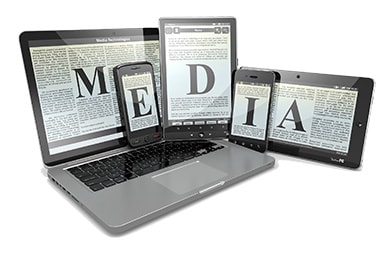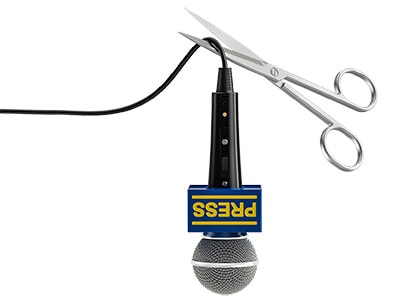Media Regulations in the United Arab Emirates
I. Introduction
 Indubitably, the inception of mass media was with newspapers that delivered information and news from the 1690s till present. Having been cultivated in the minds of the people, several other modes have been devised that make an intricate part of our lives today. Undoubtedly, the internet wins the title for most used media amongst the younger generation, though there remains loyalty to other modes like the newspaper, radio, television, etc.
Indubitably, the inception of mass media was with newspapers that delivered information and news from the 1690s till present. Having been cultivated in the minds of the people, several other modes have been devised that make an intricate part of our lives today. Undoubtedly, the internet wins the title for most used media amongst the younger generation, though there remains loyalty to other modes like the newspaper, radio, television, etc.
It is important that these platforms be adequately regulated and monitored. The regulation of media includes enforcing standard regulations and rules that must be adhered to, along with remedies and consequences of breaking them. As a means of consuming content, the internet’s exponentially rising use generally makes regulations ineffective, though the case is different in the United Arab Emirates (UAE), which has laid down comprehensive rules and regulations that govern media in the region. Additionally, it has laid down various prohibited conducts on social media as well. Below is a skeleton of how media is regulated in the UAE.
II. Regulators of Media in the UAE
- Federal Level
The National Media Council (NMC), according to Federal Law No (11) of 2016, is the federal governing body which is entrusted with undertaking the media affairs and overseeing the same in the UAE. Along with traditional media such as magazines and newspapers, various digital media platforms fall within the scope of NMC. This governmental body is affiliated with the Cabinet, and its main seat is in the Emirate of Abu Dhabi.
The NMC issues license to media institutions, and it follows up on the published, printed and broadcasted media content in the UAE. Additionally, the abovementioned content which is imported from abroad also comes within the ambit of NMC’s administration. It is mandated to:
- Draft the media legislation, followed by monitoring proper execution of the same
- Develop the media policy in the UAE
- Ensure support for the federation and encourage national unity
- Co-ordinate legislation between different Emirates to check whether they are in tune with the foreign and domestic policy of the UAE
All the UAE media organizations are obligated to comply with the rules and regulations that are issued by NMC. Additionally, they agree to provide such data and information on the demand for NMC as required. Several eServices are provided by NMC to government and individual entities in the media sector.
- Local Level
There are several bodies in the media sector that locally contribute to the development of media transactions in the UAE. They include:
- Department of Culture and Information in Sharjah
- Media Zone Authority in Abu Dhabi
- Fujairah Culture and Media Authority
III. Media Acrivities andits Regulatory Framework
Every media institution which engages in the creation of audio, print, visual and digital content in the UAE, both Free Zones and Mainland, are obligated to adhere to the standards contained in Federal Law No (15) of 1980 Concerning Press and Publications, along with other regulations and laws in force.
- Federal Law No (15) of 1980 Concerning Press and Publications
The publishing and printing licensing activities are regulated under the law above. It also applied to media content that is traditional, such as magazines, newspapers, television broadcasting, etc.
Within the law, there are certain guidelines on materials that prohibited from publication. There are penalties imposed on such publishing company, or its associated staff if they are found to violate the Publications Law. Some of the provisions that the law covers are as follows:
- Circulation of publications
- Exporting and importing publications, newsletters and newspapers
- Newspapers, new agencies and periodic publications
- Publications and publishing houses
- Prohibited content from the publication
- Films and related work
- Penalties
- Media Content Standards as per NMC Chairman’s Decision No (20) of 2010
Very clearly mentioned in the Decision is that the media institutions engaged in activities such as digital, audio, visual and print must comply with the expected standard of media contents, and the same must be in accordance with Federal Law No (15) of 1980.
This Decision requires all the institutions within its ambit to keep archives or record of all material produced, distributed, printed and broadcast by them in the last three consecutive months. Additionally, they are required to provide the Council with monthly reports which must reflect their compliance with these standards.
IV. Media System: Electronics
 The UAE NMC in 2018 implemented the latest system to govern and oversee all digital and electronic media activities, both in the Free Zones as well as Mainland. All means of expression including but not limited to writing, music, painting, photography, and all other expressions that may be transferred between individuals in any mode or form are covered under the new system. All related institutions were given a deadline to comply themselves, and correct wherever they lacked, to ensure that their activities fully comply with the new guidelines.
The UAE NMC in 2018 implemented the latest system to govern and oversee all digital and electronic media activities, both in the Free Zones as well as Mainland. All means of expression including but not limited to writing, music, painting, photography, and all other expressions that may be transferred between individuals in any mode or form are covered under the new system. All related institutions were given a deadline to comply themselves, and correct wherever they lacked, to ensure that their activities fully comply with the new guidelines.
The Electronic Media Regulation in detail provides:
- Objectives of the regulation;
- Obligations of all licensees;
- The fee structure for licenses;
- Conditions to be fulfilled by the applicant of the eMedia activity for its license;
- Regulations and instructions for carrying out all the activities.
Activities that need prior approval are as follows:
- Electronic publishing and on-call printing;
- Electronic advertisements;
- Trading, selling, printing and showcasing audio and video material on social media platforms and websites;
- News publishing
- Any other activity that the Council deems appropriate to require such approval that may be added.
V. Prohibited Content in Media in the UAE
There are national standards set by the UAE for media content requires each mass media institution that operated within the UAE to abide by such standards without any margin for error. These include a certain list of activities and conducts on social media (and other media platforms) which are strictly prohibited. There are penalties for those who engage in such activities. Certain standards that one cannot stray from are:
- Respect the regime of the UAE, its political system and symbols;
- Respect the heritage and culture of the UAE;
- Respect policies and direction of the UAE at both international as well as domestic levels;
- Must not offend the national Unity. Additionally, the social cohesion of regional and tribal conflict is strictly prohibited;
- Respect the Islamic and divine beliefs, while showing respect to other religions as well;
- Must not harm the economic system of the UAE;
- Must not spread rumours, biased or misleading news;
- Respect codes of ethics and principles of media work
- Respect copyright regulations and rules;
- Respect the government’s policy to promote national identity as well as the integration of citizens in the labour market of the media sector;
- Refrain from publishing and broadcasting information which is harmful to women, children and other social groups. Example: Hatred and violence related content;
- Refrain from disclosing confidential official contacts, military treaties, conventions or matters that have been concluded by the government with proper authority;
- Refrain from reporting distorted deliberations of courts and other regulatory bodies;
- Refrain from disclosing information related to an ongoing criminal investigation, or on such investigations which have ordered to be confidential;
- Refrain from fabricating, forging documents or present unfounded news with bad intent;
- Refrain from publishing photographs, news and comments that invade the privacy of an individual, family or destroys their reputation;
- Must not defame public officials.
The above list is not exhaustive, but only lays a gist of the prohibited content on every media platform.
VI. Advertising Content Policies: Official Guide for advertisers
The NMC in October 2018 issued an official advertising guide. This guide aims to clarify the standard for this sector in the UAE, further aiming to protect the public from marketing such promotions which do not conform to the standards. It additionally lays down the terms of licensing for all advertising activities for not just individuals, but also institutions and other companies.
Decision No (35) of 2013 by the NMC Chairman encompasses the regulations related to the content of advertising materials. In accordance with the same, each advertisement placed, produced and distributed within the UAE or the ones imported into the region must adhere to these standards for content, as well as should be in accordance with the Federal Law No (15) of 1980 Concerning the Press and Publications.
Certain specialized advertisements that require prior approval from the competent authority before being published include, but are not limited to:
- Medicine;
- Food;
- Drugs;
- Universities;
- Real estate;
- Special offers;
- Promotional campaigns.
Additionally, according to the rules and regulations of the guide, an advertisement content must:
- Not promote acts of astrological predictions and black magic;
- Respect the intellectual property rights of others;
- Comply with regulations and conditions that are related to the UAE flag, anthem and national emblem;
- Not advertise narcotic substances, alcoholic beverages, smoking, tobacco or any related goods and services;
- Not be ambiguous in any way. It should not include any misleading and false information;
The above list is not exhaustive, and there various other conditions mentioned in the guide that advertising institutions must abide with.
VII. Internet Media Regulations
Internet Access Management (IAM) Policy
IAM is implemented by the Telecommunications Regulatory Authority (TRA), and the same is done in coordination with NMC, Du and Etisalat, which are the licensed internet service providers in the region. This policy entails certain frameworks along with categories related to the internet that must be taken into consideration by these providers to ensure that security of the internet from harmful websites that contain materials which are contrary to the ethical and religious values in the UAE.
If there is any potential breach of the IAM, the TRA notifies the website operators based in the region. TRA additionally monitors online advertising. The internet service providers such as Du and Etisalat are obliged to block content if the TRA requests it. A few categories of content which are prohibited by virtue of policy are:
- Invasion of privacy
- Defamation, insult and slander
- Fraud, phishing and impersonation
- Bypassing blocked content
- Drugs
- Pornography, vice and nudity
- Pharmaceutical and medical practices in violation of the laws
- Racism, contempt of religion and discrimination
- Malicious programs
- Illegal communication services
- Terrorism
- Gambling.
The above list is not exhaustive and includes various other headers of the content that violate the abovementioned policy in the UAE. If an individual comes across prohibited content, they can report online to the TRA under this policy.
VIII. New Media
Facebook, Instagram, Twitter and YouTube are examples of the now widely used new social media platforms in the UAE (and worldwide). The government in the UAE also have social media accounts through with they actively interact with the public. This enables the government to hear the needs of the public, by providing them with feedback channels through social media.
Laws for using Social Media
Federal Law No. (5) of 2012 regarding Combatting Cybercrimes along with its amendment by Federal Law No. (12) of 2016, couple with application of several other applicable laws that protect reputation and privacy, defamation apply to everyone using social media. The residents as well as citizens of the UAE must be aware about the provisions of law that call out actions which would amount to a criminal offence.
The UAE Social Media White Paper was issued by the TRA with the objective of creating awareness related to obligations and rights while using social media. Certain examples of criminal offences are:
- Posting videos and pictures of others without their prior consent;
- Spreading information or news that is not verified by official sources;
- Threatening people.
The above list is not exhaustive, and are only example of certain conducts on social media that amount to a criminal offence.
The law on Combatting Discrimination and Hatred which is Federal Decree Law No. (2) of 2015 criminalizes an act which insults a religion and/or triggers religious hatred through any form of expression including written words, speech, pamphlets, books or online media. Insulting God, his apostles of prophets or the holy books come within the ambit of the abovementioned law.
An individual or a group of individuals engaging in conducts on social media which amount to a criminal offence under the law may become liable to a fine or a jail term as stipulated by the laws or as awarded by any competent court.
Licensing of Social Media Influencers
The social media influencers must obtain a license granted by the NMC, if paid ads are accepted to be published on their accounts. The license is generally granted for a period one year which costs AED 15,000, and the same may be renewed frequently. The license or the renewal, as the application submitted to the NMC may be, is generally issued within 30 days of such submission according to the rules.
IX. Media Office and Official Media Agencies
WAM, short for Emirates News Agency, is the official news service in the UAE. It began operations in 1976. The agency transmits news on regional, national and Arab affairs. Additionally, it is recognized as a credible source for international media. WAM Editor was recently launched by WAM which enables journalists around the world who work with various news agencies to publish stories from different corners of the world through smart phones and tablets.
X. Conclusion
 The UAE’s diverse range of media platforms are well regulated according to the international standards while taking into consideration the socio-economic needs of the country. The UAE does not only monitor the current media regulations, but also works towards its development through various approaches. Media cities were formed by the local government to encourage local, regional and international entrepreneurs to set up offices that produce the best art in all forms. Additionally, the UAE has taken keen interest in promoting films. Since such media platforms are an intricate part of all our lives, it is necessary to be aware of the legal implications of its misuse.
The UAE’s diverse range of media platforms are well regulated according to the international standards while taking into consideration the socio-economic needs of the country. The UAE does not only monitor the current media regulations, but also works towards its development through various approaches. Media cities were formed by the local government to encourage local, regional and international entrepreneurs to set up offices that produce the best art in all forms. Additionally, the UAE has taken keen interest in promoting films. Since such media platforms are an intricate part of all our lives, it is necessary to be aware of the legal implications of its misuse.
 English
English
 عربي
عربي Русский
Русский 官话
官话 português
português
 Türk
Türk 


















